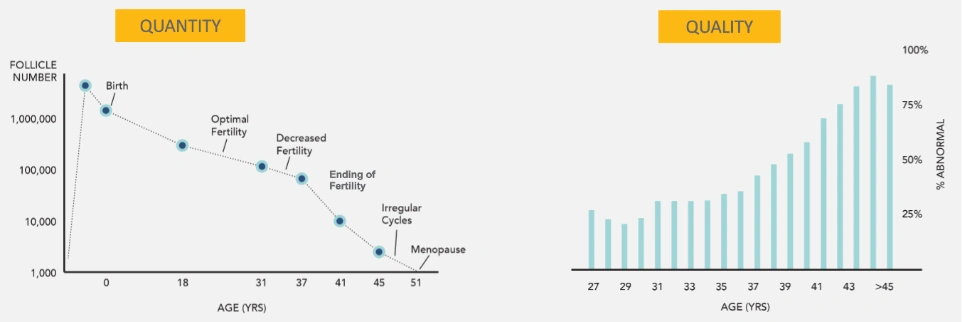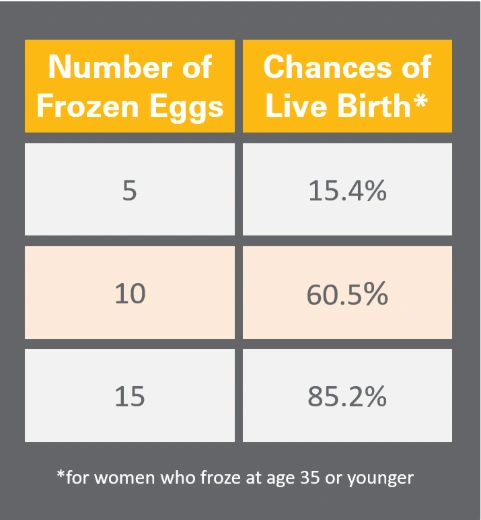
10 Things About Egg Freezing No One Talks About
Egg freezing has become an increasingly popular option for women who want to preserve their fertility and keep their family-building options open. While most people have heard the basics, there are many lesser-known details that could make a big difference in your decision. Here are 10 things about egg freezing that no one really talks about, and why it may be one of the best choices for women considering starting their family later in life.
1. The Best Time to Freeze Your Eggs Is Earlier Than You Think
While you can technically freeze your eggs until your early 40’s, The American Society for Reproductive Medicine (ASRM) recommends freezing your eggs before 35 years of age, and there's compelling science behind this. Egg quality and quantity decline significantly after this age, so freezing earlier maximizes your chances of success later. That said, women in their late 30s can still benefit, especially with guidance from the right fertility clinic.

2. Egg Freezing Is Fertility Preservation, Not a Guarantee
Egg freezing, also known as fertility preservation, is a way to give yourself more options later, not a 100% guarantee of pregnancy. The number of eggs you freeze and their quality both matter, which is why fertility experts recommend freezing multiple eggs during your optimal window. It is important to talk with your doctor about how many kids you’d like to have and follow their advice when planning your future family.
3. The Egg Count Goal Varies by Age
Younger women may only need to freeze 10–15 eggs for a good chance of future pregnancy. Women over 35 may need to freeze more eggs, since egg quality naturally declines with age.

*Data from Fertility and Sterility.
4. It’s Not Just for Women Without a Partner
Many women associate egg freezing with being single, but it’s a great option for women who want to delay pregnancy for a variety of reasons. For women who know they want children but aren't ready to start families before 35, egg freezing offers unprecedented control over reproductive timing. This technology allows women to pursue career goals, find the right partner, or simply wait until they feel ready without the constant pressure of the “biological clock”.
5. The Process Is More Involved Than You May Think
Egg freezing involves the same hormonal stimulation used in IVF. This means daily hormone injections, monitoring appointments, ultrasounds, and a minor surgical procedure to retrieve eggs. The process typically only takes 2-3 weeks, and the recovery time is usually short, but it’s helpful to plan ahead. Our six state-of-the-art fertility clinic locations across South Florida are designed to make this process as convenient as possible for busy women.
6. Frozen Eggs Can Be Stored for Years
Once frozen, eggs don’t age. Whether you use them two years later or 10 years later, the eggs remain the same biological age they were when frozen.
7. The Success Rate Depends on the Lab
Not all fertility clinics are the same. Advanced labs and experienced embryologists, like those at IVFMD, play a crucial role in ensuring eggs are frozen and thawed successfully.
Individual success rates depend on multiple factors including age at freezing, number of eggs retrieved, and future partner fertility. What works for one woman may not work for another, making personalized counseling essential.
8. Insurance Coverage Is Expanding—but Still Limited
Some employers and states are beginning to offer insurance coverage for fertility preservation. However, it’s still not universally covered, so understanding your financial options ahead of time is key.
In addition to upfront medication and procedure costs, it’s important to plan for storage fees, future thaw and transfer procedures, and potential multiple cycles. IVFMD partners with multiple financing companies because we believe financial barriers shouldn't prevent women from preserving their fertility options.
9. Egg Freezing Can Offer Emotional Relief
Many women report that egg freezing reduces anxiety about future fertility, even if they never use their frozen eggs. Egg freezing reduces the pressure of the “biological clock” and allows you to make family planning decisions on your own terms. This psychological benefit, while difficult to quantify, significantly impacts quality of life and decision-making confidence.
10. Expert Support Makes All the Difference
Navigating egg freezing can feel overwhelming, but having a supportive, knowledgeable team makes the process easier. At IVFMD, patients are guided every step of the way—from assessing fertility health and deciding the right time to freeze eggs, to understanding success rates and next steps. IVFMD’s compassionate approach ensures you feel empowered and informed throughout the journey.
Moving Forward with Confidence
Egg freezing isn’t just a medical procedure; it’s a way to preserve your future options. For women who may want to start a family after 35, it can be an extremely empowering tool. With the right timing, the right number of eggs, and the right fertility clinic, you can give yourself the best chance of achieving your family goals when the time is right.
Ready to explore whether egg freezing is right for you? Contact IVFMD to schedule a consultation with our nationally recognized fertility specialists who will provide comprehensive guidance tailored to your unique situation.
